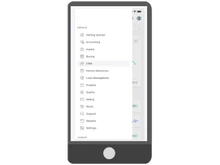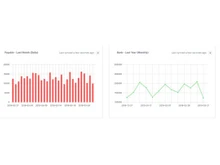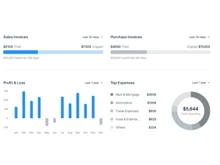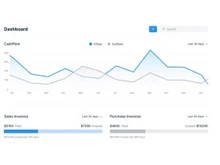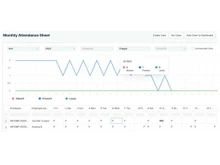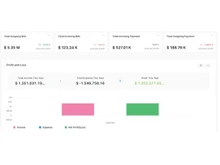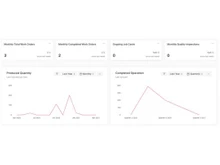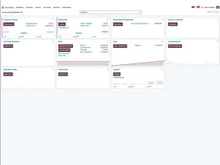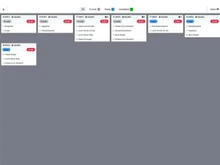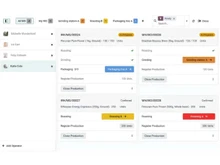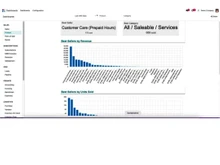Overview of ERPNext vs Odoo ERP
ERPNext offers a complete solution for efficient business management and optimization. It guarantees accurate handling of finances and reporting. The capabilities in sales, billing, and manufacturing management allow businesses to enhance supply chain efficiency and customer connections. It aids in gaining a competitive edge in the market. It also allows companies to build interactive connections with clients, drive expansion, and maintain customer loyalty.
Odoo is a bundle of different software tools that manage business operations effectively which smoothens all business processes. The various features include Accounting, CRM, POS, Inventory, Manufacturing, Purchase, Sales, eCommerce, Studio, and many more. All companies can meet their requirements under one roof. This is an open-source flexible, customizable, and scalable ERP software with an intuitive user interface for all-size companies. Odoo lets organizations scale with a single system of software that does not rely on any vendor: this results in better decision-making, less manual effort, and more automated processes.
ERPNext vs Odoo ERP Comparison: Key Features
Next, we will differentiate between ERPNext and Odoo ERP by focusing on important features of note-taking applications.
- Core Functionality: ERPNext is a comprehensive solution for ERP that supports the core functions of business activities like accounting, HR, inventory, and manufacturing. However, Odoo is an ERP suite that presents its applications ranging from CRM to e-commerce, and even project management in modular form.
- Customization: ERPNext is also highly customizable, and its user can tailor the system according to their needs. Odoo uses a modular approach in that the user can choose which modules to select and which ones to customize.
- Community and Support: ERPNext has a very active and strong community, which can be of great help for extensive support and resources. In comparison, Odoo has a very large and lively community that provides extensive knowledge and support.
- Third-Party Integrations: ERPNext provides an integration with the payment gateways and shipping providers. Odoo ERP has a far more extensive third-party app store and supports integration via its app store.
| Feature |
ERPNext |
Odoo ERP |
| Deployment Options |
Cloud-based & On-premise |
Cloud-based & On-premise |
| Customization |
Highly customizable with custom apps and workflows |
Highly modular; extensive customizations through third-party modules |
| Ease of Use |
Simple, user-friendly interface |
User-friendly but can be complex due to the number of modules |
| Industry Suitability |
Small to medium-sized businesses (Manufacturing, Retail, Healthcare, etc.) |
Suitable for businesses of all sizes (Manufacturing, Retail, e-commerce, Services, etc.) |
| Scalability |
Good scalability for small to medium-sized businesses |
Highly scalable for businesses of all sizes (small to large enterprises) |
| Third-Party Integrations |
Limited integrations with external systems |
Extensive integrations and a large ecosystem of third-party modules |
| Mobile Capabilities |
Mobile app for key functionalities |
Comprehensive mobile app for Android & iOS, covering a wide range of ERP functions |
| Implementation Time |
Quick setup for small to medium businesses |
Can take longer due to the modular nature, customization, and enterprise needs |
| Reporting & Analytics |
Real-time reporting and dashboards |
Advanced reporting with customizable dashboards, BI tools |
| User Interface |
Simple and intuitive |
User-friendly but more complex for larger installations with numerous modules |
ERPNext vs Odoo ERP: Key Differences
- Pricing: ERPNext is open-source and free to use but may require additional costs for hosting and support. In contrast, Odoo offers both standard custom editions with different pricing models.
- Deployment Options: ERPNext is available in cloud-based and on-premise versions and is adaptable for organizations having specific infrastructure needs. However, Odoo ERP also comes in both cloud-based and on-premise versions. The cloud version is scalable to a large extent, however, it is relatively costlier than the other one, while the on-premise version requires more extensive setup processes.
- User Interface: ERPNext is known to be simple and intuitive. Thus, it is easy to use for businesses with little or no ERP experience. However, Odoo ERP is very user-friendly but sometimes very overwhelming because of the number of modules and functionalities it avails.
- Industry Fit: ERPNext is well-suited to small and medium-sized enterprises with manufacturing activities. In health services, retail, education, and even NGOs. The Odoo ERP can be applied with immense versatility for nearly all forms of industries that can be broadly classified under manufacturing, retail, services, eCommerce, and construction.
- Modularity: ERPNext offers a consolidated, all-in-one module, which is easier but doesn't provide flexibility to businesses due to diverse needs. Comparatively, Odoo is very modular in nature such that businesses can choose from a wide range of different features, but it adds complexity to the setup by requiring configuration for different modules to be integrated.
- Focus: ERPNext focuses more on core ERP functions, while Odoo gives a variety of business applications.
ERPNext vs Odoo ERP: Pricing Structure
ERPNext is an open-source platform that is free to use. However, there are small business and custom plans. The small business plan starts from ₹4,100/month and for custom plans, for which users need to contact techjockey.com.
Odoo ERP offers a free platform for one app. Additionally, ₹500/user/month for all apps for the Standard Plan and ₹890/user/month for all apps and other add-ons of the custom plan.
Techjockey’s Verdict
ERPNext vs Odoo ERP are both effective for managing business operations. However, they both serve different business requirements. Whatever your business needs, you can pick any of them. ERPNext is the best for small and medium-sized enterprises particularly those that rely on simplicity, cost-effectiveness, and essential features. Odoo ERP will be much more suitable for businesses that are large and expanding, or enterprises, that are looking for complex and modulated features with good scalability in configurations.


 5 Ratings & 1 Reviews
5 Ratings & 1 Reviews



















